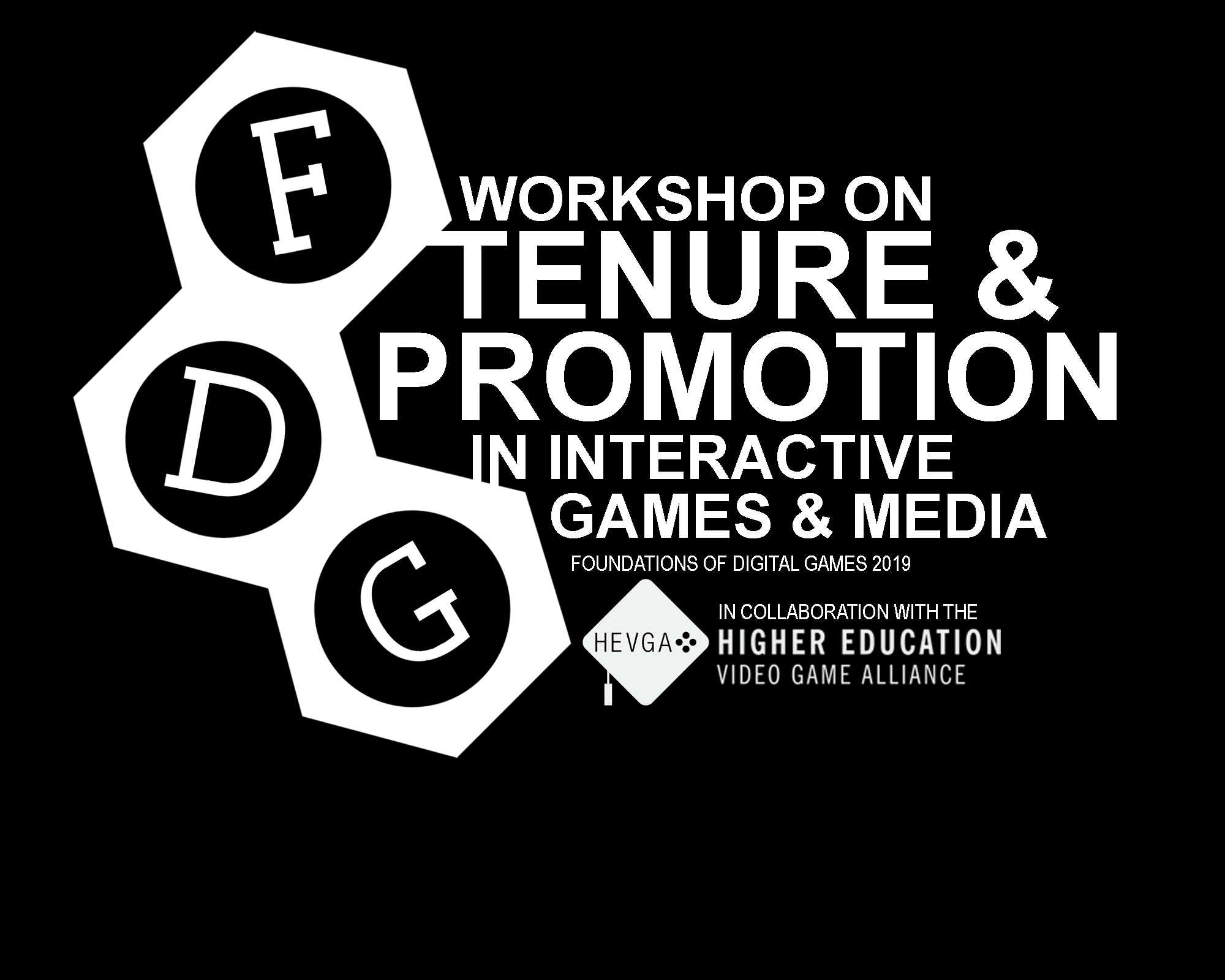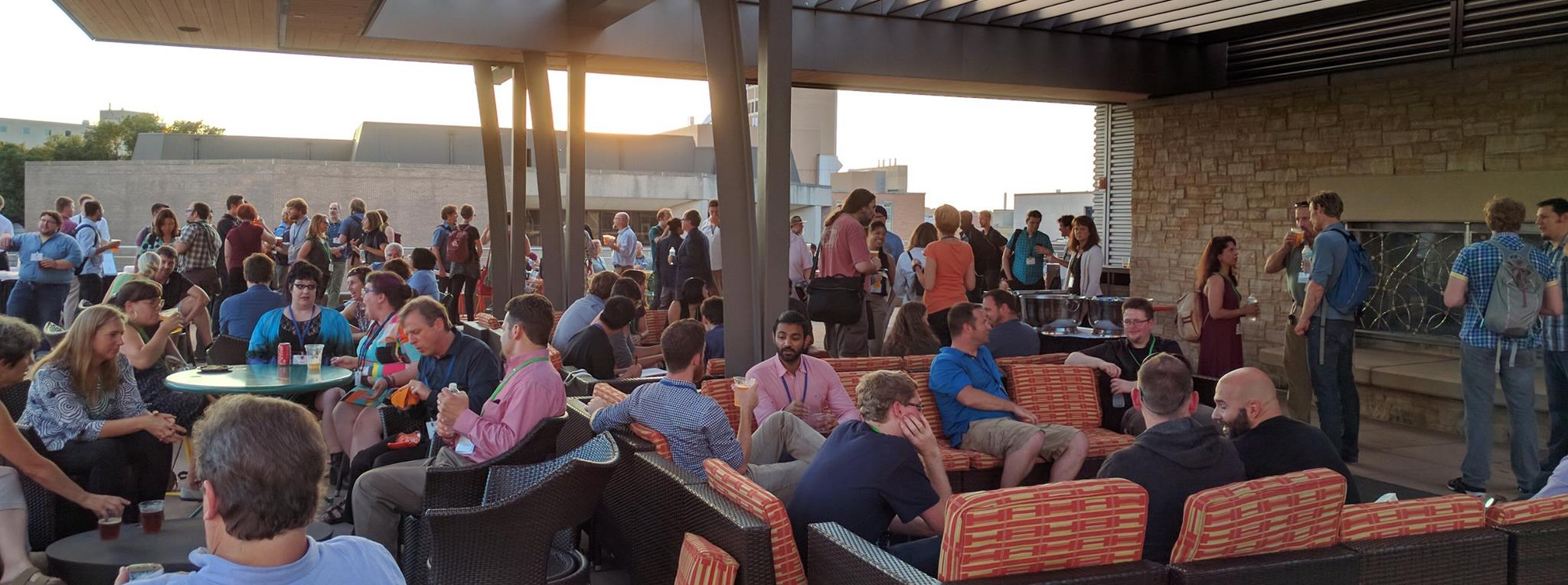FDG Workshop on Tenure and Promotion
An Exploration of the Role and Function of Faculty Review in a Multi-Disciplinary Context.
August 26, 2019: San Luis Obispo, California, USA.


The issues surrounding tenure and promotion in games-related programs, departments, centers, and colleges are complex. The interwoven fields of games studies, game design, and game development are increasingly overlapping. Meanwhile the number of individual programs and courses have exploded in higher education in the last 10 years. In their early history, programs had little guidance and formalism, generally relying on the discipline and department from which a given effort emerged. Many years later, in our contemporary, there is an increasing need to share best practices, knowledge, and expectation across these groups as the subjects, knowledge, and focus of their work are increasingly interwoven.
The workshop has been completed. Please review the published papers from the 2019 workshop

Papers published from the workshop:
Magy Seif El-Nasr. 2019. Academics without borders. In Proceedings of the 14th International Conference on the Foundations of Digital Games (FDG '19). Association for Computing Machinery, New York, NY, USA, Article 90, 1–6. DOI:https://doi.org/10.1145/3337722.3341872
Elizabeth Lane Lawley. 2019. Publication and evaluation challenges in games & interactive media. In Proceedings of the 14th International Conference on the Foundations of Digital Games (FDG '19). Association for Computing Machinery, New York, NY, USA, Article 91, 1–8. DOI:https://doi.org/10.1145/3337722.3341873
Christopher A. Egert and Andrew Phelps. 2019. Tenure and promotion in the next era of game design and development programs: some thoughts and observations. In Proceedings of the 14th International Conference on the Foundations of Digital Games (FDG '19). Association for Computing Machinery, New York, NY, USA, Article 92, 1–7. DOI:https://doi.org/10.1145/3337722.3341874
If you have any questions, please contact the workshop organizers.

Andrew Phelps is the founder and Director of the RIT Center for Media, Arts, Games, Interaction and Creativity (MAGIC). He is also the founder and former Director of the School of Interactive Games & Media at the Rochester Institute of Technology in Rochester, New York. He is the originator of the Masters of Science in Game Design & Development within the B. Thomas Golisano College of Computing and Information Sciences, as well as the Bachelors of the same name, both of which are nationally ranked in the top 10 by the Princeton Review. His work in games programming education has been featured in The New York Times, CNN.com, USA Today, National Public Radio, IEEE Computer, and several other articles and periodicals. He regularly publishes work exploring collaborative game engines and game engine technology and maintains a website featuring his work as an educator, artist, programmer, and game addict. Primary research and teaching interests include online gaming, electronic entertainment, 3 dimensional graphics and real time rendering, virtual reality, and interactive worlds. He holds the rank of Professor at the Institute.

Lindsay is Knight Chair of Interactive Media and an associate professor at the University of Miami School of Communication. He is Vice President for the Global Game Jam™ and Vice President of the Higher Education Video Game Alliance.
His work has received awards and recognition from the Games for Change Festival, the Digital Diversity Network, the Association of Computing Machinery's digital arts , Black Enterprise and others. He authored or coauthored more than 50 papers, articles and book chapters on games since 2009. His creative work has been selected for showcase internationally including New York, Paris, Sao Paolo, Singapore, Chicago, Vancouver, Istanbul, and others. Lindsay curated or co-curated Blank Arcade, Smithsonian American Art Museum’s SAAM Arcade, the Games for Change Civic and Social Impact and others.
He has given talks at the Game Developers Conference, SXSW, Games for Change Festival, the Online News Association, the Society for News Design, and many other industry events.
Between 2013 and 2018 he was the founding director of the American University Game Lab and Studio. From 2009 to 2013 he was the Armstrong Professor at Miami University’s School of Art. Lindsay also served on the board for the Digital Games Research Association (DiGRA) between 2013-2015.

Jonathan Elmergreen is the Executive Director for the Higher Education Video Game Alliance, the international professional association for faculty, students, and institutions that work in video games, interactive media, and digital media. In his work with The Alliance, he serves members of the games and higher education community through field building, academic services, public advocacy, and policymaker engagement. Under Jonathan, membership has grown to represent over 310 universities worldwide, and HEVGA has become a global leader and voice in games through strategic global partnerships with governing bodies, agencies, foundations, associations, and organizations and a strong network of esteemed fellows, scholars, and members.
Prior to HEVGA, Jonathan worked at the Games+Learning+Society Center at the University of Wisconsin – Madison in both executive administration and research, helping to implement the vision of the co-directors, Constance Steinkuehler and Kurt Squire. Here he strategically planned key meetings and events with high-profile leaders, oversaw multi-team projects, and managed large budgets and grants. Elmergreen’s academic background is in games and learning, social interaction, conversation analysis, and ethnography, and has researched areas ranging from games and literacy to interactions between doctors and terminal cancer patients. Throughout his academic career, Jonathan has received several research grants and awards, served as a conference reviewer, and been a leading member of numerous committees and advisory boards. In his scholarly work, he has been published in three peer-reviewed proceedings, one book chapter, and is currently working on multiple professional reports based on HEVGA’s work. He has given over 15 peer-reviewed and invited presentations and was an invited participant to the University of Pennsylvania Law School’s Institute for Law and Global Development ‘ideas festival’ in 2018.
While concurrently working at the Games+Learning+Society Center, Jonathan made a permanent mark on LGBT advocacy, activism, and policymaker engagement at the University of Wisconsin – Madison. In 2008, he led an initiative to overhaul policies within UW-Madison’s University Housing to address the disparity and isolation LGBTQ students, particularly trans students, felt in university housing. Through a years long process that involved garnering strong support from tenured faculty, chief housing staff, and campus administrators, he worked with a group of students to successfully lobby for the creation of a fully fledged LGBTQ and gender Learning Community with dedicated dorm rooms on its own floor and with its own staff, one of the first of its kind at a public university.
Outside of the university, Elmergreen has served as the president of a scholarship foundation to support college students, been the co-founder of a climate change carbon mitigation app, the director of a gaming convention, and served in AmeriCorps